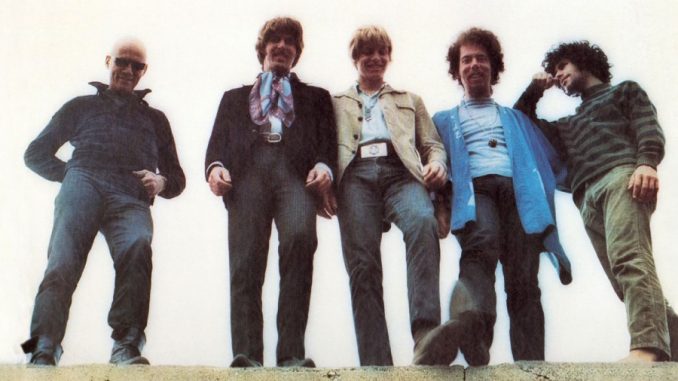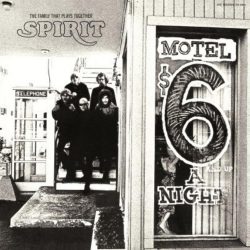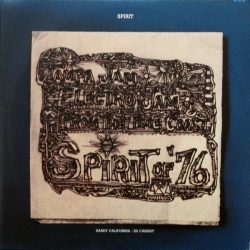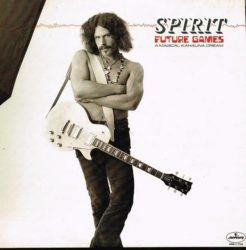
My tattered copy of The NME Book Of Rock, published in 1975, describes the LA band Spirit as, “Long a cult group, particularly among musicians. Spirit’s early records showcase excellent performances of distinctive material which rise, in ‘The 12 Dreams Of Doctor Sardonicus’, to classic status.” Already then consigned to the dustbin of history, Spirit were resurrected the in the same year as the book was published, due in part to the UK progressive blues band, Ten Years After and their guitarist, Alvin Lee. At short notice, Lee cancelled a gig in Florida and the support band, a reconfigured Spirit, lowered the ticket prices and played the gig. They sold out the arena and with the proceeds went into the studio to record what might be their masterpiece.
The original Spirit formed in the mid 60’s in Los Angeles. Randy California, the guitarist was steeped in music. His uncle owned the LA club The Ash Grove and in his early teens he was pestering visiting musicians (including Clarence White) for lessons. At the age of 15, he was in New York and briefly had a stint in Jimmy James & The Blue Flames – James being the fledgling Jimi Hendrix. Back in LA, California was joined by his stepfather Ed Cassidy (the original Mr. Skin, born 1923 and ex of Taj Mahal and Ry Cooder’s band, The Rising Sons) on drums along with Mark Andes (bass) and Jay Ferguson (vocals, percussion) and keyboard player John Locke. Between 1968 and 1970 they released four albums, all excellent, and all quite distinct from the LA sound of the time exemplified by the likes of Love and The Doors. Spirit seemed to inhabit a more rarefied air with their influences as much rooted in cool jazz as psychedelic rock, although, with California at the helm, they could deliver rock songs as powerful and catchy as anything Arthur Lee or Jim Morrison could come up with. This balance, alternatively hot and cool, along with songs which still sound fresh, allow the original albums to remain very listenable.

Of their four albums, ‘The 12 Dreams Of Doctor Sardonicus’, their swansong, is considered by many to be a classic. It includes California’s most famous song, ‘Nature’s Way’, along with the infectious ‘Mr. Skin’. Chief of all is the stereo zip zap zing of ‘Nothing To Hide’, However, I’d recommend the second album, ‘The Family That Plays Together’, as the perfect amalgamation of California’s tendency to rock out and Locke’s keyboard jazz leanings. On vinyl, both sides are opened with nigh perfect rockers, ‘I Got A Line On You’ and ‘It’s All The Same’. Both, in my estimation, far superior to their San Francisco contemporaries, Moby Grape. With Jay Ferguson turning in some brilliant songs such as ‘Silky Sam’ and ‘Aren’t You Glad’, for me it’s their true pinnacle. We have to mention an instrumental number, ‘Taurus’, included on their first self-titled album. This featured in a lawsuit against Led Zeppelin with band members claiming that ‘Stairway To Heaven’ copied the intro, the case was dismissed eventually but, here, the court’s still out.
There was a messy end to this era. Ferguson and Andes left to form Jo Jo Gunne and with California in a somewhat fragile mental state, Cassidy and Locke recruited the Staehely brothers and recorded an ersatz Spirit album, ‘Feedback’. It did diddly squat. In 1972, California released ‘Kapt. Kopter and the (Fabulous) Twirly Birds’, a response some think to his reaction to the death of Hendrix. It’s a ferocious, fuzz fuelled guitar attack which gnarls on the bones of songs such as Paul Simon’s ‘Mother And Child Reunion’ and The Beatles’ ‘Rain’. Working again under the Sprit name in a trio format with Cassidy back on board along with Larry (Fuzzy) Knight, California also recorded a concept album, ‘Potatoland’, which was rejected by his record company. Undeterred the trio toured and a UK tour saw them appear on The Old Grey Whistle Test (with a potato head on stage) but the tour ended with California having to be rescued from the Thames after diving into it while high on LSD.

Mentally bruised, California retreated to Hawaii where he apparently went into rehab and allegedly worked in a MacDonalds for a while. It was here that he became immersed in the Urantia Foundation, a melange of spiritual, philosophical, and religious thought, which, at least, seemed to offer him some comfort. Reunited with Cassidy and a new bassist, Barry Keene, they recommenced gigging and it was the aforementioned cancelled Ten Years After gig which gave them the cash to commence on the recording of ‘Spirit Of ’76′, a double vinyl affair, released in 1975. With one eye on the forthcoming US Bi-centennial celebrations, the album is quite an amazing and multi textured affair with the spirit of Dylan and Hendrix hovering over many of the sounds. It opens with a medley of ‘America The Beautiful’ and ‘The Times They Are A Changing’, setting the tone for much of the album. There are some heavy hitting rockers, layers of guitar and post-psychedelic sound effects but it’s the more introspective and spiritual songs such as ‘Urantia’, ‘Feeling In Time’ and ‘When?’ which capture one’s attention. Covers of ‘Walking The Dog’, The Stone’s ‘Happy’, a Hendrix like ‘Hey Joe’ and, best of all, a triumphant and beautiful nine-minute rendition of ‘Like A Rolling Stone’, fit seamlessly into the album’s running order. No doubt really, this is California’s masterpiece.
Unfortunately, ‘Son Of Spirit’, another trio album released later in 1975 and the 1976 release of ‘Farther Along’, featuring a reunited original band line up (aside from an absent Jay Ferguson), were both patchy although there were glimpses of California’s sparkle here and there. With punk erupting all around it seemed as if Spirit had yet again fizzled out. However California then sprang another surprise when he released ‘Future Games (A Magical Kahauna Dream)’ in 1977. Released as a Spirit album it was in essence a solo affair with California playing all instruments aside from the ever-dependable Cassidy on drums. It’s quite an amazing affair with 22 songs (or snatches of song) interspersed with dialogue taken from sources as disparate as the 1960s’ Batman TV show, Star Trek and The Muppets. That might seem quite unhinged but somehow California weaves all of this together into an eccentric but hugely entertaining listen. Few of the songs last more than a few minutes but are joyfully delivered -‘Stars Are Love’, ‘Freakout Frog’ and ‘So Happy Now’, all perfect examples. There’s a huge element of Sci-Fi inherent in the album. ‘Would You Believe’ has a similar sense of alien wonder as the Tears In Rain speech from ‘Blade Runner’ while ‘The Journey Of Nomad’ is a chilling dystopian number which envisions a Terminator like future with “awesome machines made to destroy” advancing towards us. Nestled within this helter skelter listen there is a cracking version of ‘All Along The Watchtower’, California’s take on Hendrix’s take on Dylan’s original.

To be honest, this was California’s last great album. With various line-ups, Spirit continued to release albums until 1990 but with ever diminishing returns while two solo albums (‘Euro-American’ and ‘Restless’) were pale reflections of what he could achieve. A much-trumpeted release of the lost ‘Potatoland’ album in 1981, now titled ‘The Adventures Of Kaptain Kopter & Commander Cassidy In Potato Land’ was like a comic book version of the original album. While it had some of the original recordings, they were overdubbed to get a more contemporary sound, nevertheless, the quality of a song such as ‘Turn To The Right/Left’ remains intact.
Tragically, California drowned in Hawaii in 1997, aged only 45. His 12-year-old son was caught in a riptide and California managed to rescue him but in turn he succumbed to the waves.
Going back to 1978, Spirit toured the UK and Europe as a trio (with Larry Knight on bass) and were greeted as long-lost time travellers from the psychedelic time coast. There are two live albums which were released at the time (‘Spirit Live’, on Illegal Records and ‘Made In Germany’, on Roof Records) which are invaluable documents of the time. Since California’s demise there has been a multitude of reissues and live recordings (some bonafide and some less so) which stretch across the entire career of the band. We’d recommend the original albums in the first instance, most are available on CD with ‘Spirit Of 76′, ‘The Family That Plays Together’, ‘Dr. Sardonicus’ and ‘Future Games’ essential. For those wanting to dip a toe into the water, ‘Time Circle’ is a fine two-disc summary of the early albums and ‘The Mercury Years’ delivers most of ‘Spirit of 76′ along with choice selections from the latter Spirit albums.
https://www.youtube.com/watch?v=_XKqDm3blxk



Excellent Paul – my copy of Spirit of 76 had a bad encounter with a radiator but what does play is great stuff
Great stuff and long overdue, glad to see ‘Future Games’ get a nod – the fist 4 studio albums are essential.
Farther Along is also a fine album, and were Spirit the first band with an environmental message ‘Fresh Garbage’ – look beneath your lids this morning and see the things you didn’t quite consume.
Lovely piece. Many thanks. However, I’d take issue with the Moby Grape comparison. The latter never achieved their full potential in my view, largely because of ridiculous record company tactics, but they produced stuff as good as any other West Coast band. Both bands suffered from the mental and emotional frailties of their lead members, and it’s a shame that neither were appreciated as they should have been.
Look out for a film called Model Shop by the French director Jacques Demy. Spirit are featured at the period just following the second album (I think.) It’s a good job they stuck to music rather than acting!
Randy California, not to be confused with Randy Texas, right? I always compared Spirit with Quicksilver but I’m not sure why. I grew up listening to their stuff as it was released. I stopped with 12 Dreams but after reading this excellent article I see that I should check out the later stuff as well. Thanks for all this great writing.